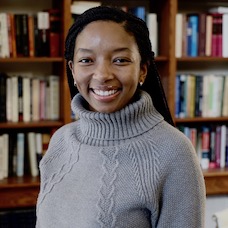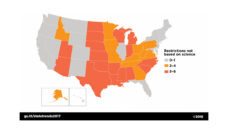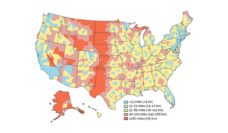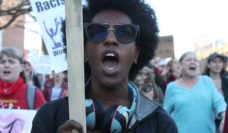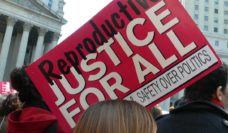Lynn M. Paltrow, J.D. recently spoke at Boston University School of Public Health about the struggle for human rights for persons capable of pregnancy in the United States. Public Health Post Fellow Jori Fortson highlights Paltrow’s work as an advocate and lawyer.
PHP: How did you get into this line of work?
Lynn Paltrow: While I was in law school, I read the Roe v. Wade decision, and read it as a decision more about the status and personhood of women. It was a decision that was inspiring, and I happened to be at a law school where a number of faculty were working with the ACLU Reproductive Freedom Project. With great luck and privilege, I got a summer job at the ACLU.
To jump forward, I got a permanent position with the Reproductive Freedom Project and started receiving cases where the arguments being used to justify limiting abortion or seeking to overturn Roe v. Wade were also being used to hurt women who did not want to end their pregnancies. The argument that fetuses should be treated as separate persons and the state should therefore have power to intervene was used to force a woman I helped represent to have cesarean surgery; it killed her and the baby. Then I started getting calls about other women being arrested in relationship to their pregnancies.
How have the arguments to give Constitutional personhood to fetuses and embryos come to be?
One answer is pretty clear: in response to Roe v. Wade anti-abortion groups looked carefully at that decision for weak points. One of the important things they noticed about the decision is the Court said, “Fetuses have never been recognized as persons in the whole sense.” So, a part of anti-abortion groups’ long-term strategy was to get recognition of fetuses as persons – I have to say now they’re talking about fertilized eggs as persons. This is so that someday when they’re up in front of the Supreme Court, and probably this Supreme Court which looks willing to overturn Roe, they will say, “Look, in 46 years the country has changed. It may not have recognized fetuses as separate persons but now, culturally, legally, we’ve changed. Look at all of these different laws where we’ve managed to get that idea put on the books, you should reverse Roe v. Wade”.
The other thing we have to realize is the idea of separate rights for fetuses is also reflected in the backlash to feminism and the achievements women were starting to make. It’s a new language of sexism. Instead of simply saying, “we discriminate against women and people capable of becoming pregnant”, they instead talk about fetal rights and never feel obligated to acknowledge that that has an implication for pregnant women.
Can you give us any important updates on the ongoing efforts to dismantle Roe v. Wade and how that could impact reproductive rights in the US?
Scores of states are proposing hundreds of laws to restrict abortion, and any one of those cases could be one that gets to the Supreme Court. I think the risk and consequences of overturning Roe are far greater than people understand. What people don’t understand is that if Roe is overturned there could be a federal law banning abortion, it wouldn’t matter what states do. The second piece is that the consequences won’t just make it harder for women to access legal abortion, it will affect all pregnant women because the anti-abortion arguments are used to justify all kinds of state control and policing of women and people capable of pregnancy. We would see a phenomenal increase in efforts to use the criminal law system to control and appropriate women.
In your paper Roe v. Wade and the New Jane Crow you discuss how mass incarceration and the prison-industrial complex have influenced cases in which a woman’s pregnancy was a factor leading to her arrest. Could you elaborate on this?
Part of what that article mentions is that we live in a country that not only has a legacy of slavery, but you also have the growth of the private jails and prison industry. It’s big business, so there’s a profit motive for mass criminalization and keeping people locked up, which we see in the kinds of cases I work on. The bottom line is if 6 million people in the US get pregnant every year, and Roe goes, or the concept of separate rights for fertilized eggs becomes more entrenched, then every one of those 6 million people become eligible for being locked up. I say that because every pregnancy bears a 15-25% chance that there will be a miscarriage or stillbirth. And, from the personified fertilized eggs perspective, by becoming pregnant, a woman has put her unborn child’s life at risk.
I want to acknowledge that this doesn’t currently, and it never will, apply equally. Not every pregnant person faces the same risk of arrest: all of our research shows that the punitive mechanisms of the state are disproportionately used against low-income women, Black women, and other women of color.
In your line of work, how do you stay hopeful?
It doesn’t matter what the government does, women are going to keep having babies and they’re going to keep having abortions. It will always be a form of massive civil disobedience that the government cannot control.
Groups like Health Care for America Now, Make the Road, and the Center for Popular Democracy are doing amazing work that gives me enormous hope, and things have shifted, which we saw in the midterm elections. Finally, people running for office were willing to talk about health care and that makes me hopeful. And it makes me hopeful that there’s a reproductive justice movement.
This conversation was lightly edited for brevity and clarity.
Feature image courtesy of Lynn Paltrow










